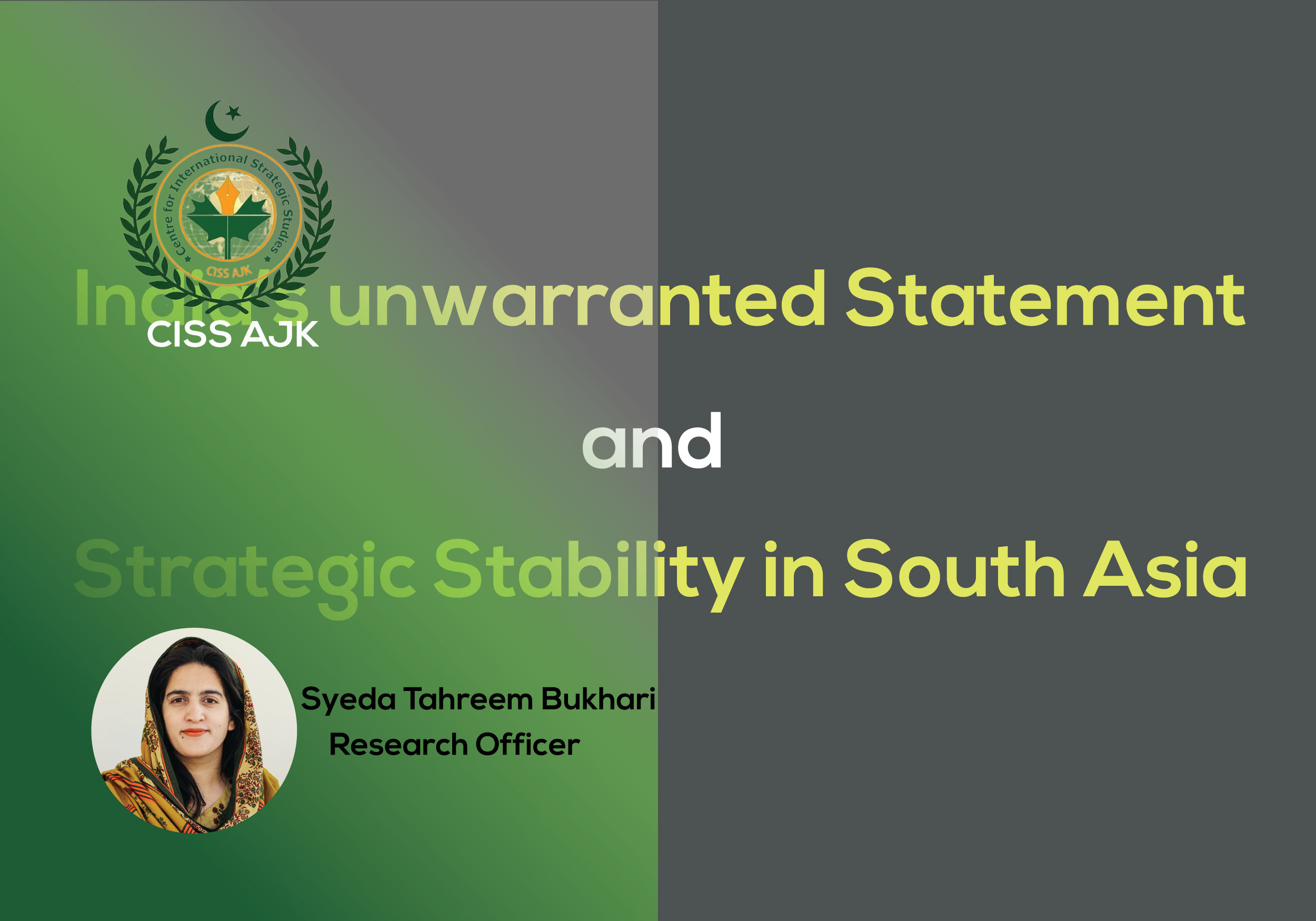The recent provocative statement by Lieutenant General Upendra Dwivedi, the General Officer Commanding-in-Chief Northern Command in Poonch while speaking at a press conference on Poonch Link up day about the readiness of their army to take back Azad Jammu and Kashmir is creating an environment of jingoism in the region. His claim about the presence of 300 terrorists who are active in Indian Illegally occupied Jammu and Kashmir and the presence of 160 terrorists sitting on the various launch pads in Azad Jammu and Kashmir is an open call of another Indian misadventure like the Balakot strike. With BJP in government, India is governed by Hindu extremists who are in pursuit of Hindutva ideology, dominating the region, thereby posing a serious threat to religious minorities in India, particularly the Indian Muslim minority and the people of Kashmir. These are evident by India’s revoking article 370 and the anti-Muslim Citizenship amendment act. Upendra Dwivedi’s statement is an in-depth manifestation of the Bharatiya Janata Party’s regressive ideology. These warmongering statements by India are also part of the BJP election manifesto to rally political support. He is towing the political line to please BJP. His statement is the continuation of the statements given by Rajnath Singh, Indian Defense minister claiming Azad Jammu and Kashmir as part of India. India’s claim is against the principles of the UN resolution on Kashmir that grants the right to self-determination to the people of Kashmir. Moreover, United Nations General Assembly recently adopted a resolution reaffirming the right to self-determination to the people subjected to colonial, foreign, and alien occupation. It is an attempt to divert attention from the Indian illegal occupation of Jammu and Kashmir and the gross violation of human rights there as state-sponsored terrorism. They are even using pressure tactics on journalists to dilute the intensity of their atrocities on innocent Kashmiris so that the brutalities from Indian side would not surface on media.Secular India, the so-called largest democracy, is turning into an autocratic state with the rise of Hindutva ideology. It is classified as an electoral autocracy in the report of V-Dem Democracy Report 2022: Autocratisation Changing Nature. It has been linked to the Narendra Modi-led Bharatiya Janata Party and the legitimization of the Hindu-nationalist agenda. With the rise of Hindutva ideology, India has adopted hegemonic designs in the region. It has redefined its no-first-use policy. It is increasing and modernizing its conventional and nuclear forces. The growing India strategic partnership with US, Russia, Israel and France in various strategic projects enhanced the power potential of India. India as a member of Quadrilateral Security Dialogue is the essential pillar of the US grand strategy of off-shore balancing. The fast-changing strategic environment has created a security dilemma in the South Asia region. These strategic projects provide India an incentive to wage a limited war against Pakistan. One of such indication is India’s unsuccessful Balakot surgical strike against Pakistan, which was deterred by Pakistan from escalating into a crisis. It was India’s blatant violation of international law by trespassing on Pakistan’s sovereignty which was overlooked by the international community for its economic interest. The international community also did not raise concerns over the unprovoked Brahmos Missile incident by India that has disturbed the strategic balance in South Asia and created an environment of mistrust between the two nuclear states. It is believed that India’s nuclear arsenals might be in hands of Hindu radicals. These unwarranted statements from the Indian side are further escalating the tensions between the two nuclear states warmongering in the region. The international community should intervene in this issue as the use of nuclear weapons will be having disastrous effects on the region as a whole, leaving implications for global security at a larger scale. India should not be allowed to make such provocative statements without any evidence that threatened the peace and strategic stability of the region. In the volatile strategic environment of South Asia, strategic restraint is not the responsibility of Pakistan only. The international community should also play its part in diluting the tension between the two hostile nuclear neighbors which is possible only by addressing the Kashmir issue. The voice of Kashmiris should be heard in resolving the issue. None of the states should be allowed to create a hawkish environment in the region through unwarranted, provocative statements and false flag operations because of the assumed destruction attached to the use of nuclear weapons that threatened the strategic stability in South Asia.
India’s unwarranted Statement and Strategic Stability in South Asia
661
previous post

